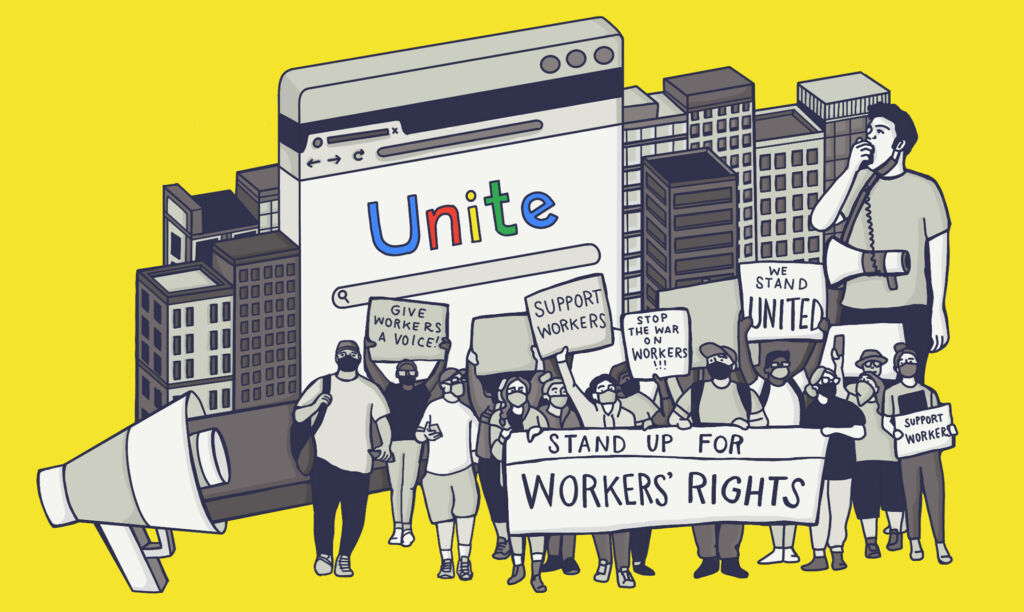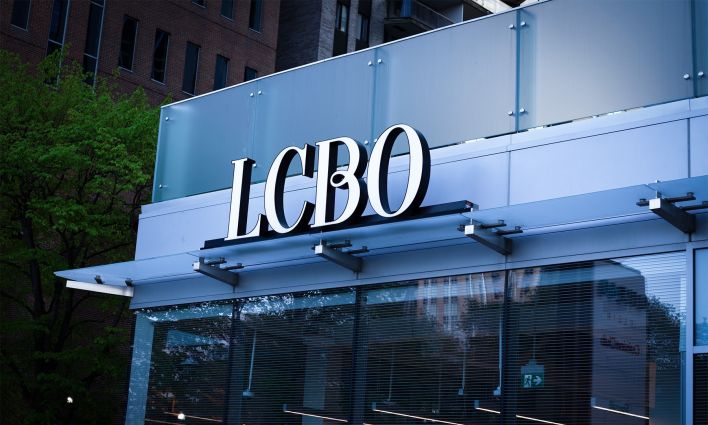ON JANUARY 4, 2021, workers at Alphabet, the parent company of tech giant Google, announced through an op-ed in the New York Times that they had formed the Alphabet Workers Union (AWU), as part of the Communications Workers of America (CWA). This would be a wall-to-wall union, meaning it would be open to all employees at Google and its affiliated entities, across all departments and regard-less of whether they were full-time, permanent employees, contractors or temporary workers.
At that point, 226 workers had signed union cards with the CWA. Several hundred more signed up in the following weeks, out of an Alphabet workforce totalling more than a hundred thousand. Thus far, the union has decided not to pursue a vote under the United States’ National Labor Relations Board, meaning it remains a minority or solidarity union as opposed to a legally recognized bargaining entity.
Still, news of the union spread quickly. “It’s a big signal,” says Johanna Weststar (she/her), a professor of labour relations at Western University in London, Ontario. “The fact that there is a unionization movement going on at Google really changes the tone in the industry.”
Weststar has studied recent developments in organizing in creative and high-tech fields, including the gaming industry. She says there has been a noticeable increase in union activity in the wider digital sector in recent years. “When I first came to study industrial relations,” she says, “there was nothing. There was no conversation about unionization in these spaces.”
There are no Canadian tech companies that rival Google for size and complexity. But the momentum and the political consciousness that motivated these Alphabet workers is not confined by borders and industries. For organizers looking to pick out trends or ideas from the Alphabet experience that might be relevant for the future of Canada’s labour movement, it may be surprising to recognize the degree to which Alphabet worker-organizers looked to examples of organizing from the late-nineteenth century and the early-twentieth century, specifically wall-to-wall organizing and organizing as a minority union outside of a legal regime.
“I think some of the shine has come off the idea of the new economy,” says Weststar.
Auni Ahsan (they/them) is a software engineer at Google and a member of the AWU executive council. They know some people wonder why Alphabet workers need a union. “Our conditions are much better than the average worker in America, at least as far as full-time workers goes,” says Ahsan. “But it’s because of the dirty secret that Google doesn’t like to talk about, which is that over half of the global workforce is contracted.”
“These workers are Google workers,” says Ahsan. “They work on Google stuff. They keep Google going. But they’re not treated with the same dignity. They’re not treated with the same benefits, basic pay, job security. I’ve known people who are waiting months and months to know if they’ll have a job next month. And they find out at the end of the month whether their contract will be renewed the next day.”
“I think some of the shine has come off the idea of the new economy,” says Weststar. “There was a real excitement around about the idea of a post-bureaucratic time… That workers and capital are no longer in antagonistic class positions. I think there is a growing understanding, now that we have learned a lot more about what these, quote unquote, new workplaces look like, that they’re actually not so different overall.” Workers have also become more vocal about a wider range of issues, including diversity and respect in the workplace. “In the past it was always better pay, better working conditions,” says Martin O’Hanlon, the president of CWA Canada. “The standard things. And we were very well versed in handling that… In the last few years, we’ve noticed a bit of a change. It’s not necessarily all about pay.”
“Every group of workers we’ve heard from in recent years has had these broader goals of equity,” says Kat Lapointe, an organizer with CWA Canada who works primarily with digital media workers. For educators at Second City, racial and sexual orientation diversity were driving factors in their recent union drive with the CWA. And Canadian game workers have made trans rights an issue in their organizing in the last two to three years.
“It is certainly driven by young people,” O’Hanlon says. “The new generation that are coming up have a different sense of what’s right, and they’re more sensitive to the fact that if their coworkers aren’t being respected for their diversity and their differences, that they’ve got to stand up and fight for that.”
Ahsan says larger societal problems, such as climate change, the ethical use of artificial intelligence, and the role of technology in the workplace, are important to many union members at Alphabet. These were also a key focus of earlier advocacy efforts at the company.
Ahsan’s first experience with advocacy at Alphabet was with a walkout in November 2018 to protest the company’s handling of sexual harassment and abuse of power, and its broader treatment of women.
“We’re not re-inventing the wheel here. It did take something special to do this at Google, but ultimately we followed the same playbook that thousands of unions have followed before us.” Auni Ahsan
Ahsan, who was born in Bangladesh and now lives in Boston, first became involved with organizing as a student at the University of Toronto. But they didn’t initially see Alphabet as a place to do organizing work. That changed when employees found out that some of them had unwittingly been contributing to Project Maven, a contract with the Pentagon to use artificial intelligence to improve the imaging systems of U.S. drones.
“I work at Google Cloud,” explains Ahsan, “and seeing the brazenness with which our executives were willing to pursue these military contracts to work with the Defense Department and really go against all of the stated values of the company by doing so, that’s when it became too close to my situation, to my job, for me to ignore.
“But at the same time,” Ahsan says, “we should be careful about the distinctions that we draw. Because ultimately these are working class issues. War is definitely a working class issue.” Ahsan points to the example of a bomb falling on a worker in the Global South. “Some of the brightest moments for the labour movement in the past have been when these issues come together and we understand a global working class solidarity.”
“I think there’s a stronger political consciousness in some of these emerging organizing groups,” says Weststar, the labour relations professor. She points out that the wall-to-wall approach that the AWU adopted recalls an earlier approach to unionization. “If you look back in labour history,” she says, “there were the industrial unions that emerged with the rise in factories, and those unions really had a stronger ideology towards thinking of unionizing everybody. Historically there were unions called ‘one big union’… To really stop reproducing class distinctions even within the labour movement.”
As a wall-to-wall union, the AWU is open to all Alphabet employees regardless of their job or whether they are permanent or temporary employees. As a minority union, there is no obligation for the employer to talk to them, but there is also more flexibility.
“What that allows them to do,” says Weststar, “is completely disregard the precedent in the legal system that says you wouldn’t have a union with programmers and cleaners and massage therapists and contract workers and full-time workers.”
“The first thing employers do when you apply for legal certification of a union is essentially try to dispute the bargaining unit that the union is putting forward,” says Weststar. “Because the employer wants to shrink that bargaining unit down… And then that just creates the circumstance where you have a group of privileged workers who are unionized, and a group of other workers who aren’t.”
“The industrial union movement of the 1930s is such an important and inspiring part of the history for me,” says Ahsan, who was involved in the initial process of deciding which established unions to approach, if any. “A big part of our confidence in the Communications Workers of America is that they organized under this model.” The CWA was founded in 1938 as the National Federation of Telephone Workers, at a time when minority unions were more common.
There are other wall-to-wall and minority unions under the CWA umbrella today. “People love talking about Google in the press,” says Ahsan, “but the Texas State Employees Union and the United Campus Workers are unions in the South where many of the workers don’t have any access to a legal bargaining process or legal union recognition. But they’ve formed unions all the same, with full voting power in the CWA.
“We’re not re-inventing the wheel here. It did take something special to do this at Google, but ultimately we followed the same playbook that thousands of unions have followed before us.”
“The principle that we have demonstrated with AWU,” says Ahsan, “is that we have a union because we say that we have a union. And it doesn’t matter what the law says because the law was made by workers forced into concessions in the first place, back in the 1930s.”
“What’s happening in this space then, is unionization has become much more of a political space, like it used to be,” says Weststar. “Like it was in the late-1800s, where unionization was not legal. And what workers had to do was go on strike and agitate and struggle, and politically force their employers to recognize them. Because there was no legal regime to force the employer to the table.
“They’re just plowing ahead with their political campaign and social campaign, knowing that the legal regime is a stumbling block for them right now,” says Weststar. “What will be very interesting to see is whether they can sustain that.”








